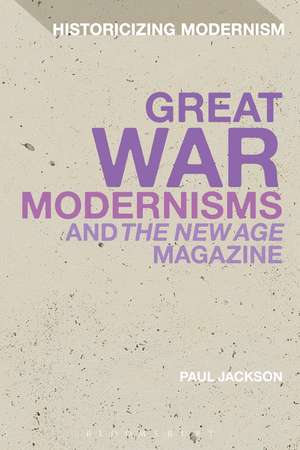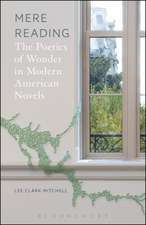Great War Modernisms and 'The New Age' Magazine: Historicizing Modernism
Autor Dr Paul Jacksonen Limba Engleză Paperback – 15 ian 2014
| Toate formatele și edițiile | Preț | Express |
|---|---|---|
| Paperback (1) | 255.76 lei 6-8 săpt. | |
| Bloomsbury Publishing – 15 ian 2014 | 255.76 lei 6-8 săpt. | |
| Hardback (1) | 772.17 lei 6-8 săpt. | |
| Bloomsbury Publishing – 11 iul 2012 | 772.17 lei 6-8 săpt. |
Din seria Historicizing Modernism
- 14%
 Preț: 540.31 lei
Preț: 540.31 lei - 30%
 Preț: 600.06 lei
Preț: 600.06 lei - 30%
 Preț: 602.11 lei
Preț: 602.11 lei -
 Preț: 447.42 lei
Preț: 447.42 lei - 30%
 Preț: 715.42 lei
Preț: 715.42 lei - 30%
 Preț: 509.93 lei
Preț: 509.93 lei - 13%
 Preț: 237.84 lei
Preț: 237.84 lei - 22%
 Preț: 259.07 lei
Preț: 259.07 lei - 22%
 Preț: 777.06 lei
Preț: 777.06 lei - 22%
 Preț: 257.68 lei
Preț: 257.68 lei - 13%
 Preț: 257.97 lei
Preț: 257.97 lei - 13%
 Preț: 256.12 lei
Preț: 256.12 lei - 22%
 Preț: 258.59 lei
Preț: 258.59 lei - 13%
 Preț: 256.29 lei
Preț: 256.29 lei - 13%
 Preț: 258.42 lei
Preț: 258.42 lei - 30%
 Preț: 716.56 lei
Preț: 716.56 lei - 22%
 Preț: 232.34 lei
Preț: 232.34 lei - 22%
 Preț: 257.32 lei
Preț: 257.32 lei - 13%
 Preț: 228.85 lei
Preț: 228.85 lei - 30%
 Preț: 657.22 lei
Preț: 657.22 lei -
 Preț: 259.07 lei
Preț: 259.07 lei - 13%
 Preț: 258.42 lei
Preț: 258.42 lei - 22%
 Preț: 258.42 lei
Preț: 258.42 lei - 13%
 Preț: 257.03 lei
Preț: 257.03 lei - 30%
 Preț: 717.05 lei
Preț: 717.05 lei - 13%
 Preț: 256.20 lei
Preț: 256.20 lei - 22%
 Preț: 259.25 lei
Preț: 259.25 lei - 30%
 Preț: 773.81 lei
Preț: 773.81 lei -
 Preț: 237.75 lei
Preț: 237.75 lei - 23%
 Preț: 236.27 lei
Preț: 236.27 lei - 13%
 Preț: 257.12 lei
Preț: 257.12 lei
Preț: 255.76 lei
Preț vechi: 294.49 lei
-13% Nou
Puncte Express: 384
Preț estimativ în valută:
48.94€ • 51.10$ • 40.41£
48.94€ • 51.10$ • 40.41£
Carte tipărită la comandă
Livrare economică 15-29 aprilie
Preluare comenzi: 021 569.72.76
Specificații
ISBN-13: 9781472527547
ISBN-10: 1472527542
Pagini: 224
Dimensiuni: 156 x 234 x 10 mm
Greutate: 0.28 kg
Editura: Bloomsbury Publishing
Colecția Bloomsbury Academic
Seria Historicizing Modernism
Locul publicării:London, United Kingdom
ISBN-10: 1472527542
Pagini: 224
Dimensiuni: 156 x 234 x 10 mm
Greutate: 0.28 kg
Editura: Bloomsbury Publishing
Colecția Bloomsbury Academic
Seria Historicizing Modernism
Locul publicării:London, United Kingdom
Caracteristici
Explores the relationship between revolutionary wartime politics and artistic developments associated with various modernisms.
Notă biografică
Paul Jackson is Senior Lecturer in History at the University of Northampton, UK.
Cuprins
IntroductionChapter 1: Great War ModernismsChapter 2: A. R. Orage and Modernist Publicism in the Era of the First World WarChapter 3: War, The New Age and Guild Socialism's Political ModernismChapter 4: The New Age's Radical Intelligentsia and ModernismChapter 5: Wyndham Lewis's Modernist Aesthetics in WartimeChapter 6: H. G. Wells and the First World WarConclusionNotesBibliographyIndex
Recenzii
'This is an intelligent and thought-provoking study which encourages us to rethink the meaning of 'modernism'. After reading Paul Jackson's book, historians and literary scholars will have to question the utility of a narrow, aesthetic definition of modernism. Jackson shows, in several fine case studies, that the concept has equal validity for explaining the many ways in which intellectuals and politicians were trying to make sense of a world in flux. Great War Modernisms is an important contribution to twentieth-century intellectual history.'
'Jackson explores theintense mood of expectancy of a new era induced in the generation of Britishintellectuals directly affected by the catastrophe of the First World War. Indoing so he shows how a wide variety of longings for regeneration are linked withthe radical experimentations in aesthetics, social organization, economics, andpolitics that fed into inter-war European thought - each of which areincreasingly recognized as different manifestations of modernism. As a result,all too familiar 'English' figures suddenly appear in a fresh 'continental'light. This new approach hopefully signals a belated readiness of Britishcultural historians to break out of decades of self-imposed insularity andisolationism when considering Europe-wide cultures of modernism.'
'Jackson explores theintense mood of expectancy of a new era induced in the generation of Britishintellectuals directly affected by the catastrophe of the First World War. Indoing so he shows how a wide variety of longings for regeneration are linked withthe radical experimentations in aesthetics, social organization, economics, andpolitics that fed into inter-war European thought - each of which areincreasingly recognized as different manifestations of modernism. As a result,all too familiar 'English' figures suddenly appear in a fresh 'continental'light. This new approach hopefully signals a belated readiness of Britishcultural historians to break out of decades of self-imposed insularity andisolationism when considering Europe-wide cultures of modernism.'


















